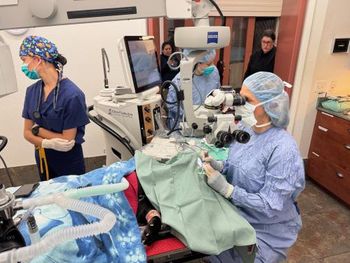
Penn veterinarians fix inherited day blindness in dogs
Philadelphia -- Veterinary researchers at the University of Pennsylvania have used genes to heal an inherited form of retinal damage in dogs that may have applications in humans.
Philadelphia
-- Veterinary researchers at the University of Pennsylvania have used genes to heal an inherited form of retinal damage in dogs that may have applications in humans.
A team led by Andras M. Komaromy, DVM, PhD, an assistant professor of ophthalmology at the University of Pennsylvania School of Veterinary Medicine, targeted inherited mutations in puppies with achromatopsia, a rare autosomal recessive disorder with an estimated prevalence in humans of about 1 in 30,000 to 50,000. The disorder affects the cones in the retina and harms color vision, central visual acuity, and most daily visual activities.
The gene therapy targets mutations of the CNGB3 gene, the most common cause of achromatopsia in humans. These dogs represent the only natural animal model outside of mice to have this form of the disorder.
In addition to the puppies, dogs 54 weeks of age and older saw a reproducible reduction in visual symptoms of the disorder after treatment. Changes to puppies and the older dogs were effective for the 33 months of study and are most likely permanent, say the researchers.
With the identification of three-quarters of the roughly 200 genes affecting retinal diseases, research into gene therapy will allow doctors to someday treat these previously untreatable conditions.
”The successful restoration of visual function ... has ushered in a new era of retinal therapeutics,” says Komaromy.
Newsletter
From exam room tips to practice management insights, get trusted veterinary news delivered straight to your inbox—subscribe to dvm360.




